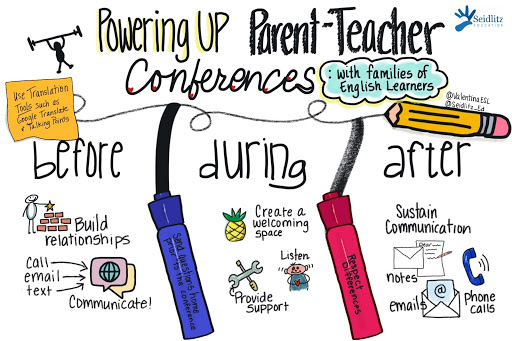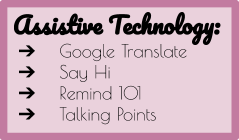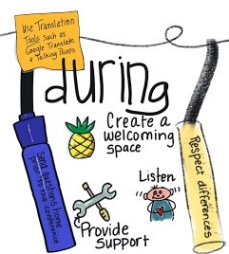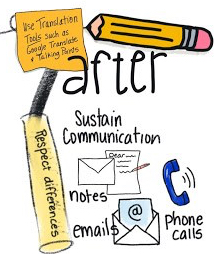
Building relationships between teachers and parents is also key to increase student motivation and academic achievement.
From my personal experience as an immigrant with parents who didn’t speak English when we came to America, I can tell you that the culture of the American school system was confusing to my parents. It was not like the school system where they grew up; the traditions and customs they knew were very different from those in America. Parental expectations varied, and involvement held a different meaning. Parents, students, and teachers held different roles. It took a long while for my parents to become accustomed to the American way. Rarely did they attend school events when I was young. I can imagine that many of my teachers may have thought this was a sign of disengagement or a lack of care for my education, when in fact, my parents brought us to America for a better education and a better future.
As educators reaching out to families from various backgrounds, there are ways to make parent-teacher conferences more powerful. With a few subtle touches BEFORE, DURING, and AFTER , we can increase the potential for a successful parent-teacher conference.
BEFORE
Much like Thanksgiving dinner or any big get-together, most of the work of a parent-teacher conference happens before the actual event. What you do beforehand can make the conference run more smoothly.
Prior to planning a parent-teacher conference or having the need for a conference, reach out to families. There are many reasons to reach out. You could reach out simply to introduce yourself through a phone call, an email, a letter, or another means you find best fits the families you serve.
 Reaching out to find out more about the families you serve is a second positive way to initially interact with parents and guardians. Finding out about who your students live with, what languages they speak, what language they prefer to communicate in, hobbies they enjoy, jobs and careers their family members have, etc. can help you as you plan instruction and future conferences.
Reaching out to find out more about the families you serve is a second positive way to initially interact with parents and guardians. Finding out about who your students live with, what languages they speak, what language they prefer to communicate in, hobbies they enjoy, jobs and careers their family members have, etc. can help you as you plan instruction and future conferences.
A third reason to reach out prior to a conference is with good news. Sharing a celebration or something positive about the student builds relationships and helps parents see school as a safe place.
 Finally, once you have decided mutually upon a date, place, and time to confer with the family that works for everyone, send home questions prior to the meeting. Parents will appreciate knowing ahead of time what will be shared and discussed. This will give them time to prepare if needed. Sometimes not knowing what the conference is about and what will be discussed can be scary for families. Parents may have negative preconceived notions about parent-teacher conferences, but knowing ahead of time that the conference is about their child’s progress or about goals will help parents to feel at ease about the meeting.
Finally, once you have decided mutually upon a date, place, and time to confer with the family that works for everyone, send home questions prior to the meeting. Parents will appreciate knowing ahead of time what will be shared and discussed. This will give them time to prepare if needed. Sometimes not knowing what the conference is about and what will be discussed can be scary for families. Parents may have negative preconceived notions about parent-teacher conferences, but knowing ahead of time that the conference is about their child’s progress or about goals will help parents to feel at ease about the meeting.
If families seem reluctant about meeting, consider whether one or more of these factors that may be contributing to their reluctance:
- Child care
- Language barrier
- Transportation
If you feel that one of these may be the reason, find a way around it. For example, let parents know that they can bring younger siblings. I had a friend who always had crayons and coloring sheets ready for younger siblings. Parents were grateful for the extra care. If parents need a translator or interpreter for the conference, plan ahead to reserve one. Reach out to school or district staff for help in securing the necessary support to make the conference a success. If transportation or time is the factor, see about home visits. One of my fondest memories is of the home visits one of my brother’s teachers made regularly because my mom could not make it to our school. This teacher would come and sit with my mom. Though they could not communicate in a common verbal language, we knew she cared. She showed up. She was invested.
DURING
Greet families warmly. School buildings are not comfortable places for everyone. By creating a warm, happy environment, we can help change the narrative. A simple smile goes a long way. The nonverbals we project send messages of either belonging or the opposite. In some cases, it might even be a good idea to let the front office know that you are expecting a visitor. If the front office is the first impression, it’s important that they, too, are a warm and welcoming experience.
 Start with positives and celebrations. It never hurts! Everyone loves to hear good news about their children. Share freely any highlights and growth that the student has made. Parents enjoy hearing that you see how wonderful their child is.
Start with positives and celebrations. It never hurts! Everyone loves to hear good news about their children. Share freely any highlights and growth that the student has made. Parents enjoy hearing that you see how wonderful their child is.
Listen with open ears and an open heart when parents share information. As the meeting progresses, ask questions or invite parents to share freely about their child, themselves, and their home life. The information they give you will likely be helpful as you plan future instruction. When families feel heard and respected as the experts about their children, we begin to create a true partnership that has the potential to increase student success!
A conference is a great opportunity to invite parents to future school events and programs. If there is an avenue to bring parents into the school community, seek it out and help families get engaged! Some parents may not know about school events, programs, or opportunities, and others may just need a welcoming nudge.
If a translator or interpreter is in attendance, be careful to give plenty of time for translation. Stop every now and then to give time for the translator to communicate your message and for parents to ask questions or respond.
Provide parents with the support they request. Some parents ask for additional work to be sent home while others would like advice about what language to speak with their child. A good rule of thumb if parents ask about language is to advise them to speak in the language they feel most comfortable and confident speaking. Their child will benefit most from hearing proficient language structures and strong vocabulary in any language.
AFTER
 Follow the conference with additional communication through notes, emails, or phone calls. Keeping open doors of communication will create a system of support that helps the student progress more rapidly.
Follow the conference with additional communication through notes, emails, or phone calls. Keeping open doors of communication will create a system of support that helps the student progress more rapidly.
Author and researcher Brené Brown says, “Connection is why we’re here; it is what gives purpose and meaning to our lives.” Building relationships and trust takes time, especially in the educational setting. One teacher that I worked with set a calendar notice to remind her when to send home communication for each student. This was helpful to her so that she would not forget a child or overcommunicate with one but undercommunicate with others. She felt it kept her on track. Sometimes it was a quick note, and other times it was a more lengthy phone call.
In the end…
Our overarching goal is to create a better world by educating the students we have in our classrooms. But we can’t do it alone. We need parents as partners in the journey.